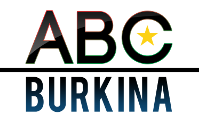The good news: Maize and sweet potato are excellent for making bread and pastry
My last weekly newsletter gave rise to many comments from readers and also a good deal of hope. Therefore I return to the subject today with some further details (and a few corrections), but most of all to widen the scope of our views on this issue.
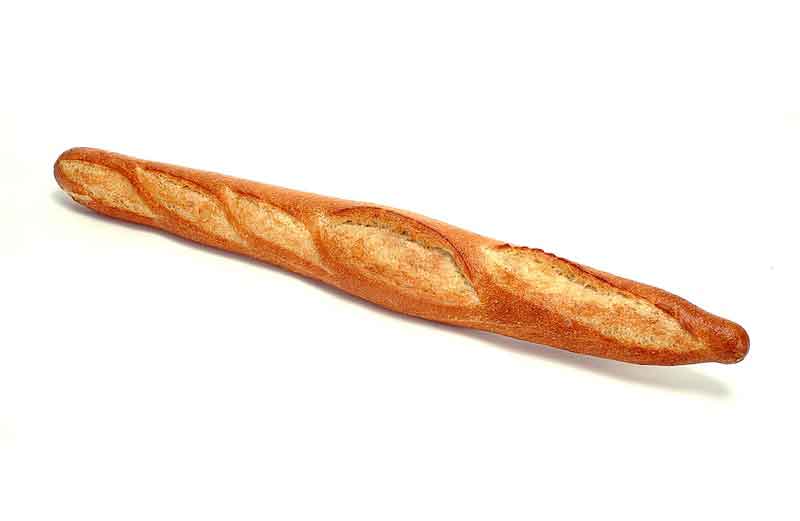
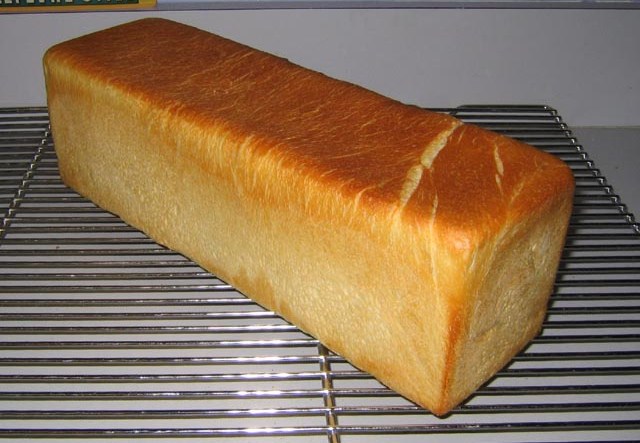 we been thinking about the impact colonisation (or globalisation at the present time) has had on our eating habits? Let me tell you a brief story as an example. In 1986 I travelled the road from Bangui; Central Africa to Ouagadougou, Burkina Faso as a backpacker. At the end of September I had arrived with a friend in a small village in northern Cameroon, 2 km from the border with Nigeria. My friend had brought some bread, the shape of the long traditional Parisian baguette (see picture, left). As this was insufficient he sent a child to buy some more. The child came back with Nigerian bread, the kind Parisians call “pain de mie” (the loaf, pictured right). The next day I arrived in N’Djamena, the capital of Chad, where I also bought some bread, this time it came as a thin cake, Arab style. Thus, within a short time and space I had entered three different countries, which had been independent for over 50 years. Still the shape of their bread bore the mark of former rulers, French, British and Arabic!
we been thinking about the impact colonisation (or globalisation at the present time) has had on our eating habits? Let me tell you a brief story as an example. In 1986 I travelled the road from Bangui; Central Africa to Ouagadougou, Burkina Faso as a backpacker. At the end of September I had arrived with a friend in a small village in northern Cameroon, 2 km from the border with Nigeria. My friend had brought some bread, the shape of the long traditional Parisian baguette (see picture, left). As this was insufficient he sent a child to buy some more. The child came back with Nigerian bread, the kind Parisians call “pain de mie” (the loaf, pictured right). The next day I arrived in N’Djamena, the capital of Chad, where I also bought some bread, this time it came as a thin cake, Arab style. Thus, within a short time and space I had entered three different countries, which had been independent for over 50 years. Still the shape of their bread bore the mark of former rulers, French, British and Arabic!
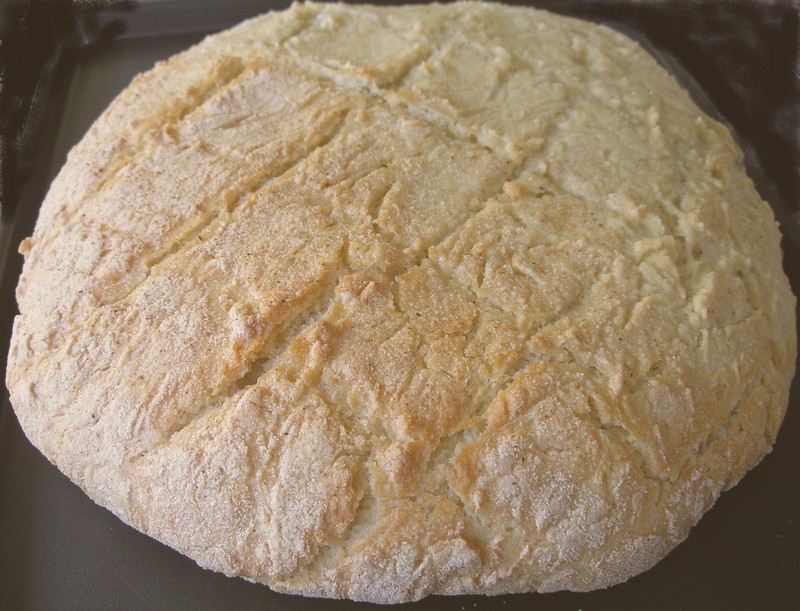
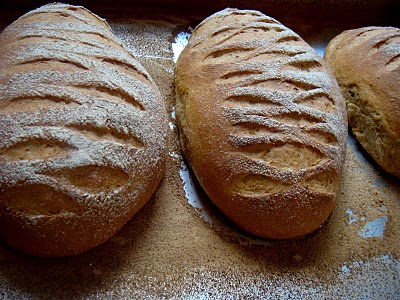 The consumption of bread and flour products has increased 20-fold over the past 50 years in West Africa, although hardly any wheat at all is grown in the region, so much that imports of wheat and wheat flour has gone up by 3.7% annually.
The consumption of bread and flour products has increased 20-fold over the past 50 years in West Africa, although hardly any wheat at all is grown in the region, so much that imports of wheat and wheat flour has gone up by 3.7% annually.
Therefore it is time to stop for a while and think about what we really wish to eat. Is it not possible to have food essentially made from what our country’s own fields produce? It is interesting to take a look at the possibilities of the sweet potato in this regard.
It can be used in many different ways although in quantities somewhat lower than suggested in my previous newsletter. Bakers who add sweet potato flour to their dough, often use 10 -20%, but not more. The rate of 80% suggested in some news items from Cameroon or in the weekly Jeune Afrique is probably due to a misinterpretation. The word “potato flour” has been mixed up with the whole, raw potato. But even with a 20% addition of potato flour, the potential definitely remains interesting. A country like Burkina Faso could for example save 2-3 billion CFA francs ( 656 CFA francs = 1 Euro) on imports and could guarantee a good income for many farmers, for instance in the Sissili region.
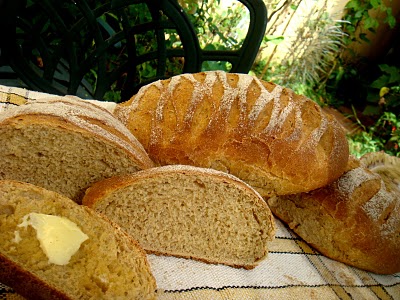
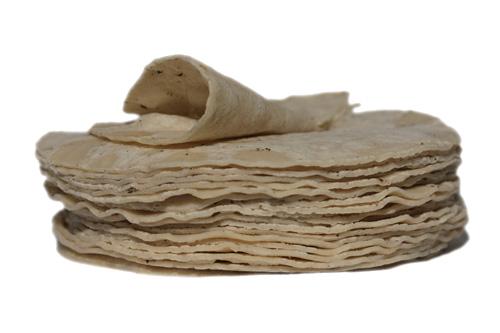 Some bakers who have already started using the sweet potato go even farther. They often incorporate 40-50% of sweet potato flour in their wheat dough. This is particularly feasible in pastry-making. As its name suggests, this kind of potato flour is slightly sweet. It is quite possible that many customers, who regularly buy a sandwich during the day, easily may switch to a sweet potato flour pastry, given the choice.
Some bakers who have already started using the sweet potato go even farther. They often incorporate 40-50% of sweet potato flour in their wheat dough. This is particularly feasible in pastry-making. As its name suggests, this kind of potato flour is slightly sweet. It is quite possible that many customers, who regularly buy a sandwich during the day, easily may switch to a sweet potato flour pastry, given the choice.
Another option which could help reduce dependence on imported food commodities in West Africa : could be the tortilla, widely consumed in Mexico and less expensive than bread. It is daily Mexican staple food, served with a range of different sauces and present in a large variety of traditional dishes. It is indeed a substitute for bread : over 300 million tortillas are eaten every day.
The main ingredient is maize (corn). The grains are soaked in lime water, to make them softer. They are then ground to powder and water is added to form the dough (masa). A small piece of dough is pressed between two round plates of about 20 cm in diameter to give the final shape. The tortilla is then briefly baked, either to be served immediately or to be part of various other dishes. These cakes are mostly made in tortilla bakeries and sold by the kg. (To learn more, seeMexique-fr).
Indeed, it is time to take a break and ask ourselves what we want to see on our plates. Obviously the idea is not to do away with bread outright and immediately. But West Africa does not produce wheat, whilst the production of maize increases every year. The production of sweet potato could easily make rapid progress.
It is with this in mind that “Solidarity” (an international solidarity organisation) will be present in Dakar on February 2-11 (and therefore also during the World Social Forum and the International Agricultural and Livestock Fair – FIARA)to show home-made food other than wheat based bread. Maize tortillas (from Mexico), millet (India), manioc (Brazil) and also bread made from millet and maize (by Indian women trained by French bakers of organic millet bread in 2008) will be on display for participants to taste and three different workshops will be organised on the subject. For those of you who have the opportunity: “See you in Dakar!”
To learn more, in particular about the financial outlook for a tortilla-making co-operative in West Africa, we suggest you read an in depth study made by the organisation Solidarity : « Rentabilité de la production de tortillas de maïs en Afrique de l'Ouest »
Koudougou, January 8, 2011
Maurice Oudet
Director, SEDELAN
